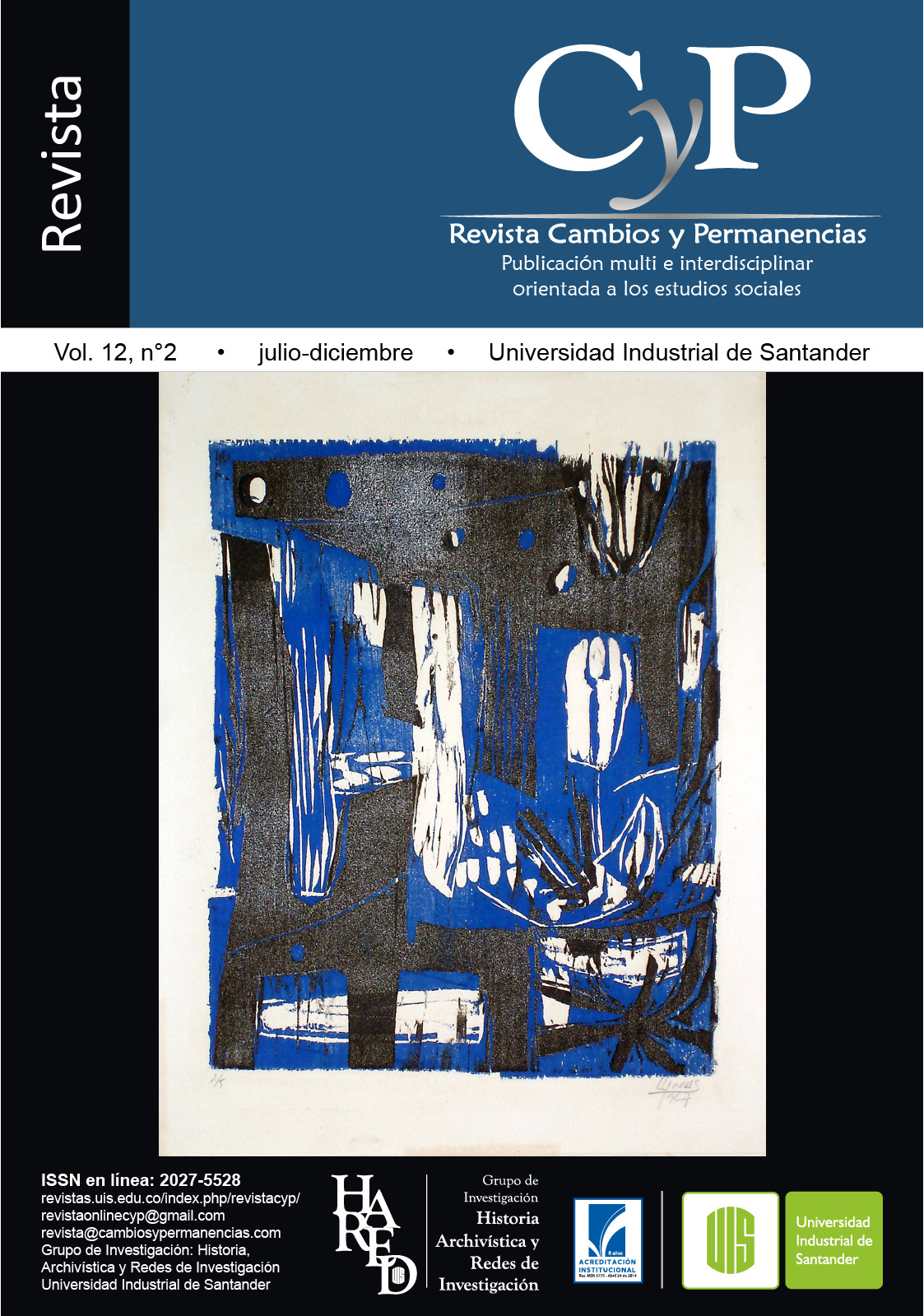Contrast from the perspective of the subject: Critical reflections of the investigative approach about the Gypsy Woman
Published 2021-12-13
Keywords
- perspective of the subject,
- critical reflexivity,
- gypsy woman
How to Cite
Copyright (c) 2021 Revista Cambios y Permanencias

This work is licensed under a Creative Commons Attribution 4.0 International License.
Abstract
Through this writing, the particular research experience of the author Fanny Novack was recovered, who offered to present her research work on the life stories and narratives of gypsy woman from the Rom community, with access higher education. This with the objective of contrast the way of approaching it with the forms proposed from the perspective of the subject. The analysis implied questioning how the approach with the gypsy community did it happen, acknowledging the obstacles that she faced in their academic career, from a reflexivity that implies subjecting each of strategies, decisions and methodological operations to critical scrutiny, in a way that is possible to generate critical knowledge about themselves. Throughout the analysis, the contrast is raised with respect to the exposed work, but also in relation to the experiences of each of the team members. From which it is realized that the major questions appear around the position as researchers, hierarchical with respect to the subject; and the way in which it impacts on the conceptual resignifications about the Rom community and the gypsy woman.
Downloads
References
- Abajo, J. E., y Carrasco, S. (2004). Experiencias y Trayectorias de éxito escolar de gitanas y gitanos en España. Madrid, España: CIDE Instituto de la Mujer.
- Ariza, M., y Velasco, L. (2015). El estudio cualitativo de la migración internacional. En Métodos cualitativos y su aplicación empírica: por los caminos de la investigación sobre migración internacional. México: UNAM.
- Baumann, Z. (1999). La globalización: consecuencias humanas. Buenos Aires, Argentina: FCE.
- Bourdieu, P. (2002). La distinción. Criterio y bases sociales del gusto. Madrid, España: Taurus.
- Burawoy, M. (2018) Prefacio: ciencia y reflexividad. En J. I. Piovani y L. Muniz Terra (Coord.), Condenados a la Reflexividad. Apuntes para repensar el proceso de investigación social. Buenos Aires, Argentina: Clacso.
- Castel, R. (1997). La metamorfosis de la cuestión social. Una crónica del salariado. Buenos Aires, Argentina: Paidós.
- Cavalli Sforza, L., y Cavalli Sforza, F. (1994). ¿Quiénes somos? Historia de la diversidad humana. Barcelona, España: Crítica.
- De Brensson, H. (1993). Calvario de los gitanos en Europa. Acuerdo Rumania-Alemania. I Tchathcipen, (3), 18-20.
- Fernández, A. M. (2007). Las lógicas colectivas: imaginarios, cuerpos y multiplicidades. Buenos Aires, Argentina: Biblos.
- Fraser, A. (1995). The Gypsies. Cambridge, EE. UU.: Blackwee.
- Guber R. (2018) Volando rasantes. Etnográficamente hablando. Cuando la reflexividad de los sujetos sociales irrumpe en la reflexividad metodológica y narrativa del investigador. En J. I. Piovani y L. Terra (Coords), Condenados a la Reflexividad. Apuntes para repensar el proceso de investigación social. Buenos Aires, Argentina: Clacso. Recuperado de http://biblioteca.clacso.edu.ar/clacso/se/20180419015342/Condenados_a_la_reflexividad.pdf
- Ley Nacional de Salud Mental 26. 657 del 25 de noviembre de 2010. (2010). Recuperada de http://servicios.infoleg.gob.ar/infolegInternet/anexos/175000-179999/175977/norma.htm
- Muñiz Terra L., y Roberti, E. (2018). Del análisis a la escritura de textos biográficos. El lugar de la reflexividad y en las interpretaciones y puestas en montaje de las biografías. Buenos Aires, Argentina: Clacso.
- Nuñez, S. X., y Farías, R. (2010). Las autobiografías de los inmigrantes gallegos en Argentina (1860-2000) testimonios, ficción y experiencia. En migraciones y Exilios, (11), 57-80.
- Okeley, J. (1997). The Traveller_Gypsies. Cambridge, England: Cambridge University Press.
- Rascovan, S. (2018). Orientación Vocacional con Sujetos Vulnerabilizados. Experiencias sociocomunitarias en los bordes. Buenos Aires, Argentina: Noveduc.
- San Román, T. (1997). Vecinos Gitanos. Madrid, España: Akal.
- Sandoval Álvarez, R. (2011). Sujetos que piensan más allá del Estado y el capital. Desacatos, (37), 7-17.
- Sandoval Álvarez, R. (2018). Problemas y desafíos de la formación en la metodología de la investigación. México: Grietas editores.
- Sandoval, J. (2013). Una perspectiva situada de la investigación cualitativa en ciencias sociales. Cinta moebio, (46), 37-46.
- Sosa Velázquez, M. (2012) ¿Cómo entender el territorio? Universidad de Rafael Landívar, Guatemala: Editorial Cara Parens. Recuperado de https://web.ua.es/en/giecryal/documentos/documentos839/docs/bmfunesp-5.pdf
- Stefanovsky, V. (2020). Mujeres Gitanas: conocer para transformar. [Videoconferencia].
- Torres Carrillo, A. (2014). Producción de conocimiento desde la investigación crítica. Nómadas, (40), 69-83.
- Velasco, L. (2020). Migración internacional y biografías multiespaciales: una reflexión metodológica. Roma, Italia: Universidad de La Spienza.
